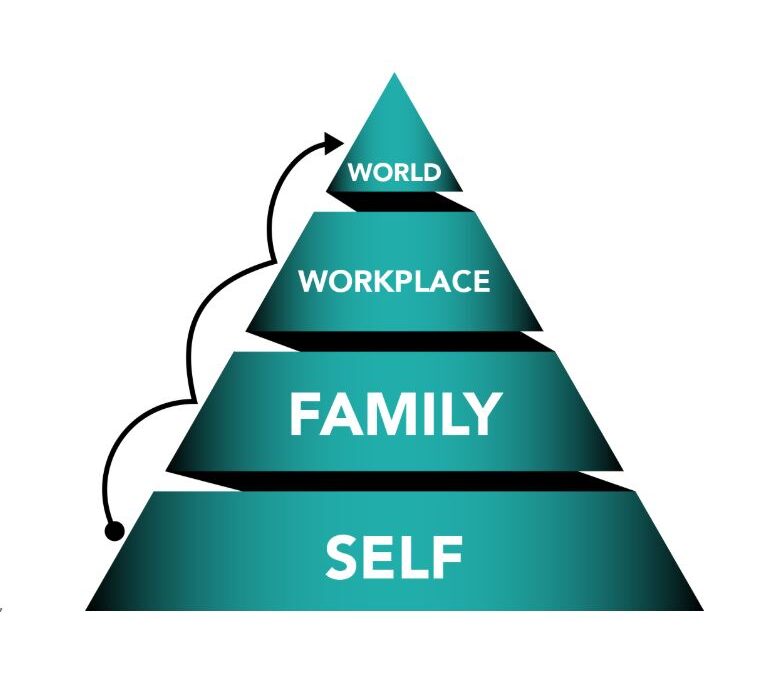Today’s BIG IDEA—Leadyoufirst.com is dedicated to the idea that there is a logical order to leadership—that the best way to build a lasting leadership legacy is to lead yourself well first, then be highly proactive and intentional with your family leadership role, and then seek to influence the marketplace, your community, and the world.
The world needs leaders who lead themselves and their families well, and bring that strong foundation to the workplace.
People often get this backwards, or the sole focus is on leadership in the workplace (income, titles, performance, or promotions).
Frequently, our families get left overs after work takes the vast majority of our time and energy. In some cases, family is not seen as a leadership role at all. It is especially common for men to focus on their leadership role at work where they may feel more competent and in control.
But when we aren’t leading ourselves well, or we begin to neglect our leadership role at home, part of us knows the truth—and this can eat away at our focus, confidence, and sense of peace.
It can lead to deep regret for lost opportunities we may never get back. Psychologists call this cognitive dissonance—we know we that our actions are out of alignment with our most important values.
A few years ago, I fell into this trap. I got a promotion I had been seeking for a long time and was overseeing a large department with a mission I was passionate about. I had never been so busy—the busyness was addictive—and I felt important.
But something was gnawing at me. My work hours kept increasing, I found it hard to really listen to my wife, and I had very little time left over for other people. I certainly had no time to think about—or actively shape—the future I truly wanted. It felt like a runaway train.
After nearly a year of this, I had to ask myself if this was just a season—or my new lifestyle.
Around that time, I came across the following quotes by John Maxwell:
“I have always judged true success by what the people closest to me think of me.”
“If you don’t change the direction you are going, you are likely to end up where you’re headed.”
And I did not want to keep heading toward a future where I was physically and mentally absent at home. For me, it meant a job change, and I have never regretted it.
Take control of your calendar
We often love our families in our hearts, but we must love them with our calendars.
One of the biggest problems modern leaders face is chronic busyness. Most of us are overscheduled, and as a result—living in a chronic state of overload.
This can occur at work and in our personal lives.
Years ago, management mogul Peter Drucker predicted that choice overload would require the leaders of the future to practice incredible discipline in managing themselves, and being highly selective about what they would devote their time to.
We often act as if we are victims of our calendars—instead of their authors.
Taking control of your calendar means scheduling the most important things every week to ensure those things have a consistent place of priority in our lives. It also means saying No to lots of stuff.
To quote Stephen Covey—make sure you put the “big rocks” into your calendar first.
With respect to our families, controlling your calendar might mean regular date nights with our spouse, time with our children, how many hours we work, when we arrive home each night, or scheduling important family events.
What is acceptable to you? What are your guiding principles around this?
The calendar is vitally important when it comes to leading your family well. And if leading your family is important to you, these appointments with your family should be almost immovable.
After all, you cannot be the leader of your home if you are never home!
Recap of Family Leadership Pillars
If you missed any of the prior posts, I recommend you go back and read them now, but here are a few reminders:
- Family vision & values chart the course. A family vision statement is your north star. It’s your intended destination and helps you determine when you are off course. Your family values help you determine what is vitally important to your family. Values become a filter for what you put in your calendar every week, and the decisions you make every day.
- Marriage is the foundation of a strong family. Parenting is important, but marriage should come first because united parents make for optimally stable homes. I once went to a marriage seminar where the speaker said that marriage is like a garden. If you leave a garden unattended for more than a week, weeds start to grow. The same is true with of marriage. You cannot leave them unattended for very long and expect them to thrive. And when your garden doesn’t look nice, you don’t blame the garden—you blame the gardener. Our marriage class also taught us that no other relationship has the ability to grow our character and expose our selfishness the way that marriage does. But this is usually the opposite of the message we get from culture and media. The common media message is usually that the purpose of marriage is to make us happy, so when we aren’t happy with our marriage, we tend to assume something is wrong instead of leaning into the character lessons that would help us grow. If you have a conflict in your marriage, don’t avoid it. Be a proactive leader and address it.
- Invest time in developing skills as a parent. I used to think that when I became a parent, I would somehow suddenly know what to do. In retrospect, that thinking is clearly ridiculous. Leading yourself well is certainly a great foundation for parenting, but parenting is not a skill that most people automatically know how to do well. Invest in a parenting class, read a book, or have dinner with someone who has raised great kids. Whatever you do, few things may be more important than setting aside regular time to intentionally develop yourself as a parent.
- Manage money well. Money management is a self-leadership skill and also vital to family leadership. Poor handling of money can spell destruction and serious stress for families, not to mention being a top cause of divorce. Bank account statements can paint a clear picture of a family’s values and vision, and the overall health of the family. Good money management is not a skill anyone is born with, but it is a skill that every family leader needs. And it must be learned and cultivated. Things like having an emergency fund, living within your means, doing a budget, not having debt, having a will, saving for college, investing for retirement, having the right kinds of insurance, and teaching your kids how to handle money—all dramatically affect the emotional stability of your family.
Have a great weekend!
Parker
Suggested Resources
- Developing the Leader Within You by John Maxwell
- Link to previous posts in the family leadership series https://leadyoufirst.com/category/the-pillars-of-family-leadership/




